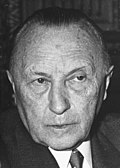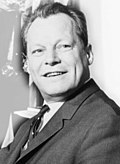1961 West German federal election: Difference between revisions
Cassiopeia (talk | contribs) m Reverted edits by 2A02:3038:20A:BFE9:AD08:4354:18ED:6C15 (talk) (HG) (3.4.12) Tags: Huggle Rollback Reverted Disambiguation links added |
m General cleanup following disruption; style harmonization; adding links to prevent any confusion (via WP:JWB) |
||
| (43 intermediate revisions by 24 users not shown) | |||
| Line 25: | Line 25: | ||
| popular_vote1 = '''14,298,372''' |
| popular_vote1 = '''14,298,372''' |
||
| percentage1 = '''45.3%''' |
| percentage1 = '''45.3%''' |
||
| swing1 = {{decrease}} 4. |
| swing1 = {{decrease}} 4.9 [[Percentage point|pp]] |
||
| image2 = {{CSS image crop|Image =Willy Brandt.jpg|bSize = 120|cWidth = 120|cHeight = 160|oTop = 0|oLeft = 0}} |
| image2 = {{CSS image crop|Image =Willy Brandt.jpg|bSize = 120|cWidth = 120|cHeight = 160|oTop = 0|oLeft = 0}} |
||
| Line 35: | Line 35: | ||
| popular_vote2 = 11,427,355 |
| popular_vote2 = 11,427,355 |
||
| percentage2 = 36.2% |
| percentage2 = 36.2% |
||
| swing2 = {{increase}} 4. |
| swing2 = {{increase}} 4.4 [[Percentage point|pp]] |
||
| image3 = {{CSS image crop|Image =Bundesarchiv Bild 183-87989-0060, Erich Mende.jpg|bSize = 120|cWidth = 120|cHeight = 160|oTop = 0|oLeft = 0}} |
| image3 = {{CSS image crop|Image =Bundesarchiv Bild 183-87989-0060, Erich Mende.jpg|bSize = 120|cWidth = 120|cHeight = 160|oTop = 0|oLeft = 0}} |
||
| Line 45: | Line 45: | ||
| popular_vote3 = 4,028,766 |
| popular_vote3 = 4,028,766 |
||
| percentage3 = 12.8% |
| percentage3 = 12.8% |
||
| swing3 = {{increase}} 5. |
| swing3 = {{increase}} 5.1 [[Percentage point|pp]] |
||
| map_image = 1961 German federal election - Results by constituency.svg |
| map_image = 1961 German federal election - Results by constituency.svg |
||
| Line 59: | Line 59: | ||
}}{{politics of Germany}} |
}}{{politics of Germany}} |
||
[[Federal elections in Germany|Federal elections]] were held in [[West Germany]] on 17 September 1961 to elect the members of the fourth [[Bundestag]]. The [[CDU/CSU]] remained the largest faction, winning 242 of the 499 seats. However, the loss of its majority and the [[German Party (1947)|All-German Party]] losing all its seats led to the CDU having to negotiate a coalition with the long-term junior coalition partner, the [[Free Democratic Party (Germany)|Free Democratic Party]], leading to a demand for long-term chancellor Konrad Adenauer to leave office in 1963, halfway through his term. |
[[Federal elections in Germany|Federal elections]] were held in [[West Germany]] on 17 September 1961 to elect the members of the fourth [[Bundestag]]. The [[CDU/CSU]] remained the largest faction, winning 242 of the 499 seats. However, the loss of its majority and the [[German Party (1947)|All-German Party]] losing all its seats led to the CDU having to negotiate a coalition with the long-term junior coalition partner, the [[Free Democratic Party (Germany)|Free Democratic Party]], leading to a demand for long-term chancellor Konrad Adenauer to leave office in 1963, halfway through his term. |
||
==Campaign== |
==Campaign== |
||
[[Image:Bundesarchiv Bild 173-1326, Bonn, Bundestagswahl, Wahlplakate.jpg|thumb|right|200px|Election posters]] |
[[Image:Bundesarchiv Bild 173-1326, Bonn, Bundestagswahl, Wahlplakate.jpg|thumb|right|200px|Election posters]] |
||
The election campaign occurred in the context of the Berlin Crisis and the erection of the Berlin Wall.<ref>{{Cite journal |last=Barnes |first=Samuel H. |last2=Grace |first2=Frank |last3=Pollock |first3=James K. |last4=Sperlich |first4=Peter W. |date=1962 |title=The German Party System and the 1961 Federal Election |url=https://www.cambridge.org/core/journals/american-political-science-review/article/abs/german-party-system-and-the-1961-federal-election1/4DE5C1ABE2EC179628BFA39AAC3C14E2 |journal=American Political Science Review |language=en |volume=56 |issue=4 |pages=899–914 |doi=10.2307/1952792 |issn=1537-5943}}</ref> |
|||
For the first time, the SPD announced a Chancellor candidate who was not chairman of the party: [[Willy Brandt]], the Governing Mayor of [[West Berlin]]. After the building of the [[Berlin Wall]], he gained more and more sympathy, while chancellor [[Konrad Adenauer]] was criticised for not showing enough support for the people of West Berlin. Adenauer had to save the [[absolute majority]] of CDU and CSU, but, considering his age and his long term as chancellor, there were big doubts if he should lead the country in a fourth term. |
For the first time, the SPD announced a Chancellor candidate who was not chairman of the party: [[Willy Brandt]], the Governing Mayor of [[West Berlin]]. After the building of the [[Berlin Wall]], he gained more and more sympathy, while chancellor [[Konrad Adenauer]] was criticised for not showing enough support for the people of West Berlin. Adenauer had to save the [[absolute majority]] of CDU and CSU, but, considering his age and his long term as chancellor, there were big doubts if he should lead the country in a fourth term. |
||
Latest revision as of 20:58, 1 December 2024
This article needs additional citations for verification. (February 2024) |
| |||||||||||||||||||||||||||||||||||||||||
All 499 seats in the Bundestag[a] 250 seats needed for a majority | |||||||||||||||||||||||||||||||||||||||||
|---|---|---|---|---|---|---|---|---|---|---|---|---|---|---|---|---|---|---|---|---|---|---|---|---|---|---|---|---|---|---|---|---|---|---|---|---|---|---|---|---|---|
| Registered | 37,440,715 ( | ||||||||||||||||||||||||||||||||||||||||
| Turnout | 87.7% ( | ||||||||||||||||||||||||||||||||||||||||
| |||||||||||||||||||||||||||||||||||||||||
 Results by constituency (left) and seats by state (right). The pie chart over West Berlin shows the composition of its legislature. | |||||||||||||||||||||||||||||||||||||||||
| |||||||||||||||||||||||||||||||||||||||||
| This article is part of a series on the |
| Politics of Germany |
|---|
 |
Federal elections were held in West Germany on 17 September 1961 to elect the members of the fourth Bundestag. The CDU/CSU remained the largest faction, winning 242 of the 499 seats. However, the loss of its majority and the All-German Party losing all its seats led to the CDU having to negotiate a coalition with the long-term junior coalition partner, the Free Democratic Party, leading to a demand for long-term chancellor Konrad Adenauer to leave office in 1963, halfway through his term.
Campaign
[edit]
The election campaign occurred in the context of the Berlin Crisis and the erection of the Berlin Wall.[1]
For the first time, the SPD announced a Chancellor candidate who was not chairman of the party: Willy Brandt, the Governing Mayor of West Berlin. After the building of the Berlin Wall, he gained more and more sympathy, while chancellor Konrad Adenauer was criticised for not showing enough support for the people of West Berlin. Adenauer had to save the absolute majority of CDU and CSU, but, considering his age and his long term as chancellor, there were big doubts if he should lead the country in a fourth term.
Results
[edit] | ||||||||||||
|---|---|---|---|---|---|---|---|---|---|---|---|---|
| Party | Party-list | Constituency | Seats | |||||||||
| Votes | % | Seats | Votes | % | Seats | Elected | West Berlin | Total | +/– | |||
| Social Democratic Party | 11,427,355 | 36.22 | 99 | 11,672,057 | 36.47 | 91 | 190 | 13 | 203 | +22 | ||
| Christian Democratic Union | 11,283,901 | 35.76 | 78 | 11,622,995 | 36.32 | 114 | 192 | 9 | 201 | −21 | ||
| Free Democratic Party | 4,028,766 | 12.77 | 67 | 3,866,269 | 12.08 | 0 | 67 | 0 | 67 | +24 | ||
| Christian Social Union | 3,014,471 | 9.55 | 8 | 3,104,742 | 9.70 | 42 | 50 | 0 | 50 | −5 | ||
| All-German Party | 870,756 | 2.76 | 0 | 859,290 | 2.68 | 0 | 0 | 0 | 0 | −17 | ||
| German Peace Union | 609,918 | 1.93 | 0 | 587,488 | 1.84 | 0 | 0 | 0 | 0 | 0 | ||
| Deutsche Reichspartei | 262,977 | 0.83 | 0 | 242,649 | 0.76 | 0 | 0 | 0 | 0 | 0 | ||
| German Community | 27,308 | 0.09 | 0 | 21,083 | 0.07 | 0 | 0 | 0 | 0 | 0 | ||
| South Schleswig Voters' Association | 25,449 | 0.08 | 0 | 24,951 | 0.08 | 0 | 0 | 0 | 0 | 0 | ||
| Electoral Group for a Neutral Germany | 778 | 0.00 | 0 | 0 | 0 | 0 | New | |||||
| Independents and voter groups | 2,164 | 0.01 | 0 | 0 | 0 | 0 | 0 | |||||
| Total | 31,550,901 | 100.00 | 252 | 32,004,466 | 100.00 | 247 | 499 | 22 | 521 | +2 | ||
| Valid votes | 31,550,901 | 96.05 | 32,004,466 | 97.43 | ||||||||
| Invalid/blank votes | 1,298,723 | 3.95 | 845,158 | 2.57 | ||||||||
| Total votes | 32,849,624 | 100.00 | 32,849,624 | 100.00 | ||||||||
| Registered voters/turnout | 37,440,715 | 87.74 | 37,440,715 | 87.74 | ||||||||
| Source: Bundeswahlleiter | ||||||||||||
Results by state
[edit]Constituency seats
[edit]| State | Total seats |
Seats won | ||
|---|---|---|---|---|
| CDU | SPD | CSU | ||
| Baden-Württemberg | 33 | 27 | 6 | |
| Bavaria | 47 | 5 | 42 | |
| Bremen | 3 | 3 | ||
| Hamburg | 8 | 8 | ||
| Hesse | 22 | 3 | 19 | |
| Lower Saxony | 34 | 15 | 19 | |
| North Rhine-Westphalia | 66 | 41 | 25 | |
| Rhineland-Palatinate | 15 | 10 | 5 | |
| Saarland | 5 | 5 | ||
| Schleswig-Holstein | 14 | 13 | 1 | |
| Total | 247 | 114 | 91 | 42 |
List seats
[edit]| State | Total seats |
Seats won | |||
|---|---|---|---|---|---|
| SPD | CDU | FDP | CSU | ||
| Baden-Württemberg | 33 | 16 | 5 | 12 | |
| Bavaria | 39 | 23 | 8 | 8 | |
| Bremen | 2 | 1 | 1 | ||
| Hamburg | 10 | 1 | 6 | 3 | |
| Hesse | 23 | 2 | 14 | 7 | |
| Lower Saxony | 26 | 6 | 11 | 9 | |
| North Rhine-Westphalia | 89 | 35 | 35 | 19 | |
| Rhineland-Palatinate | 16 | 6 | 6 | 4 | |
| Saarland | 4 | 3 | 1 | ||
| Schleswig-Holstein | 10 | 7 | 3 | ||
| Total | 252 | 99 | 78 | 67 | 8 |
Aftermath
[edit]The absolute majority was lost by the conservative union due to the gains of the liberal FDP under Erich Mende. From 1961 on, the Union, SPD and FDP established an electoral "triopoly" in the Bundestag that would last until 1983.
Konrad Adenauer remained Chancellor, building a coalition between the CDU/CSU-FDP. In 1962 he had to announce a fifth cabinet: The FDP had temporarily left the coalition after the secretary of defense, Franz Josef Strauß (CSU), had ordered the arrest of five journalists for publishing a memo detailing alleged weaknesses in the German armed forces (known as the Spiegel scandal). In 1963 Adenauer finally retired; Ludwig Erhard took over his position as head of the coalition government.
Further reading
[edit]- Barnes, Samuel H.; Grace, Frank; Pollock, James K.; Sperlich, Peter W. (1962). "The German Party System and the 1961 Federal Election". American Political Science Review. 56 (4): 899–914. doi:10.2307/1952792. JSTOR 1952792.
Notes
[edit]- ^ As well as the 22 non-voting delegates for West Berlin, elected by the West Berlin Legislature.
- ^ As well as 9 non-voting delegates for West Berlin.
- ^ As well as 13 non-voting delegates for West Berlin.
References
[edit]- ^ Barnes, Samuel H.; Grace, Frank; Pollock, James K.; Sperlich, Peter W. (1962). "The German Party System and the 1961 Federal Election". American Political Science Review. 56 (4): 899–914. doi:10.2307/1952792. ISSN 1537-5943.



